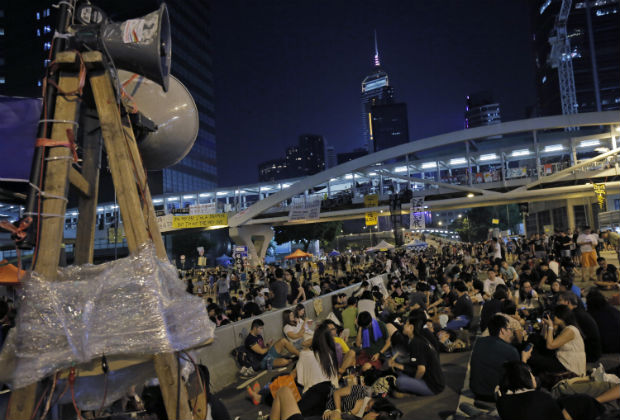
Student pro-democracy protesters continue to occupy the streets around outside government headquarter in Hong Kong, Sunday, Oct. 5, 2014. AP
HONG KONG – Exhausted Hong Kong demonstrators were debating the next step in their pro-democracy campaign Monday as their numbers dwindled and the city returned to work after a chaotic week of mass protests.
The government had been forced to shut its headquarters on Friday due to the ranks of protesters blocking the access roads, leaving 3,000 civil servants at home. On Monday a knot of protesters kept the entrance to the complex partially blocked with barricades, but opened a narrow section to allow workers to enter.
“I’m happy the protesters opened the barriers today,” one female civil servant said as she pushed through. “I need to work!”
In fear of a repeat of ugly scenes a week ago when police unleashed tear gas on the crowds, only a committed core of about a thousand had waged a vigil through the night.
After a public holiday Wednesday and Thursday, for many in the city Monday was their first day back at work.
With some buses still diverted due to roads occupied by the protesters, highways were gridlocked with traffic and subway trains were packed as frustrated commuters tried to find a different route to work.
“They have to let the cars through as soon as possible – they are blocking the way,” said Michael Lau, 25, who rides the tram to work.
Secondary schools in the affected areas also reopened on Monday as the city administration pushed for Hong Kong to get back to normal.
Exhaustion sets in
While relieved that they had not been cleared away by police ahead of the government’s Monday deadline to abandon the protest sites, tiredness was beginning to show for the few hundred who remained.
“It’s good that nothing (no police action) happened but… I hoped that something would happen so we could end this thing quickly,” said 18-year-old Otto Ng Chun-lung, a pro-democracy protester and sociology student.
“This is my opinion – because everyone is just exhausted and we can’t go long, long, long time.”
But some of those on the streets have vowed to stay and others have promised to return later in the day, insisting their campaign was not losing steam after the week-long standoff that has at times erupted into violence.
“We’re going to be here until we get a response from the government,” said 20-year-old student Jurkin Wong, who was sitting with friends as they woke from fitful slumber on the streets. “We have to stay here. It’s for our future.”
“If I’m not working, I will be here – the numbers are dropping but our hearts have never left,” piano teacher Denise Wong told AFP.
The protesters are demanding the right to nominate who can run for election as the former British colony’s next leader in 2017. China’s Communist authorities insist only pre-approved candidates will be able to run, a system activists dismiss as “fake democracy.”
Handed back to Chinese rule in 1997, Hong Kong is governed under a “one countries, two systems” deal that guarantees civil liberties not seen on the mainland, including freedom of speech and the right to protest.
But tensions have been rising over fears that these freedoms are being eroded, as well as rocketing inequality in the Asian financial hub.
Plea to leave
University staff made an impassioned plea Sunday for students to head home after the city’s embattled chief executive Leung Chun-ying issued an ominous warning that the situation could “evolve into a state beyond control” if the protests do not end soon.
Other movement supporters have also been trying to persuade the remaining students that they should beat a tactical retreat.
“Even those (members of the public) who support the movement don’t want to lose money,” political analyst Willy Lam told AFP.
“A large number of people here have stocks and shares and have lost money.”
“I think it’s a wise decision to make a strategic draw down (of people on the ground) as it’s hard to convince the public that continuing the blockade would achieve results.
“If talks between the students and the government prove totally futile… and (Chinese president) Xi Jinping is against concessions, then it’s possible to switch on the movement again. By that time they would have the moral high ground.”
There were hopes of a breakthrough on Sunday when student leader Lester Shum met with mid-ranking officials with the aim of setting conditions for a meeting with Leung’s deputy Carrie Lam. However, no agreement was announced.
Originally posted: 8:13 am | Monday, October 6th, 2014

